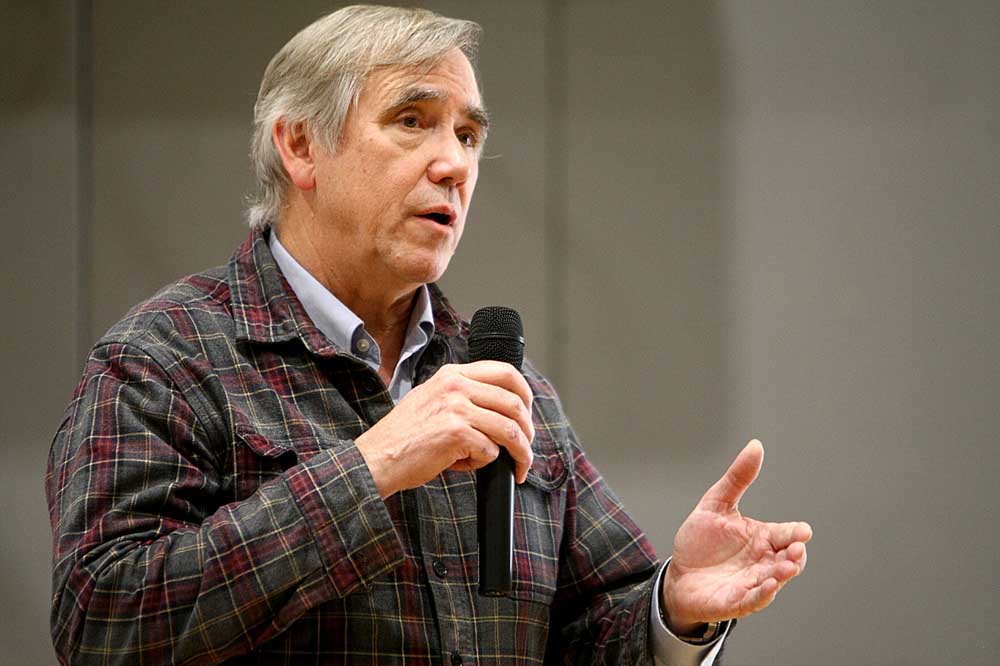Capital Chatter: Legislative activity shifted to Portland
Published 7:00 am Thursday, July 27, 2017

- Capital Chatter: All sides waiting for Brown to lead
Oregon’s center of legislative activity shifted north from Salem this week.
Hundreds of U.S. and Canadian legislators, other governmental officials, university presidents, nonprofit leaders, lobbyists and corporate representatives met at the Portland Marriott for the Pacific NorthWest Economic Region Annual Summit.
Trending
Yes, the public-private nonprofit spells “NorthWest” with the “W” capitalized. That creates its acronym of PNWER. No, the name does not include the type of organization, such as “alliance,” “association” or “forum.”
I found that weird, as if something constantly was missing from PNWER’s name. Just like one participant’s nametag said, “Oregon Dept. of State” — wow! Oregon has its own diplomacy agency — until he added the left-off word “Lands” for “Oregon Department of State Lands.”
PNWER, which was holding its 27th annual summit, describes itself as “a preeminent bi-national advocate for regional, state and territorial economic issues across the region.”
That might be. It seemed like a reasonable forum for discussing forestry, agricultural trade, disaster resilience, invasive species, tourism and other issues common to Northwest states, provinces and Canadian territories. Its members are Alaska, Idaho, Montana, Oregon and Washington, Alberta, British Columbia, Saskatchewan, and Yukon and the Northwest territories.
• Not so quotable: Oregon state Rep. Arnie Roblan, D-Coos Bay, is the new president.
In real life, he speaks like the rest of us. But the PNWER press release about his becoming president quotes Roblan as saying, “The transcendent cooperation and collaboration facilitated by PNWER has resulted in the provision and sharing of key infrastructure, education, entrepreneurial expertise and state and federal funding that has made possible the successes we in Oregon are experiencing.”
Trending
Feel free to let me know what that means.
• T here’s more than one Vancouver: Microsoft President Brad Smith gave the keynote luncheon speech on Wednesday. He stressed the need for every person to have broadband internet access. He is right. That same point was made throughout the conference, especially by rural and tribal representatives.
In his speech, Smith made Microsoft sound wonderful, innovative and benevolent. However, he and his speechwriters seemed to forget he was orating in Portland.
He extolled the collaborative research opportunities of two great universities — Washington and British Columbia. He lauded Microsoft’s commitment to Vancouver and stressed the need for seaplane service between Seattle and Vancouver, in part because Microsoft employees travel back and forth. He displayed graphics comparing Seattle and Vancouver — belatedly mentioning that he should have included Portland.
By Vancouver, he meant the city in Canada, not the city in Washington state a few miles from where he was speaking.
Smith’s ignoring of Vancouver USA brought back memories of how the Washington Legislature seemed equally tone-deaf to the need for modern, seismically stable bridges across the Columbia River — linking the two states’ transportation infrastructure through Portland and Vancouver USA.
• A truck driver and a Shakespeare: A common theme at the conference: Education is the most important investment for a healthy economy and a livable community.
Employers bemoaned the lack of skilled workers. If a region has a shortage of certain types of workers, why does the education system take so long to adjust? Sen. Jeff Kruse, R, Roseburg, and others raised that question.
Sen. Betsy Johnson, D-Scappoose, noted that career/technical education classes in schools are making a comeback after being abandoned by the public education system. She pointed to Salem-Keizer’s Career Technical Education Center as a success. She also explained the Oregon Manufacturing Innovation Center being developed in Scappoose, for which Johnson has been a sterling advocate.
Few things deserve the label of “world-class.” The OMIC will.
College today often is seen as a place to learn a career and not just get a life-broadening education. That led Denise Mullen, president of Oregon College of Art and Craft, to ask, “How do you create an environment in which a Shakespeare can develop today?”
As far as truck driving, it is the No. 1 occupation in many states, according to Dr. J oe Robertson, president of Oregon Health & Science University. So what will happen to the millions of truck and delivery drivers when they are replaced by the autonomous trucks and delivery drones now being developed? For Robertson, the question was how our nation would provide health care in a changing economy.
• F ailure starts with success: Oregon State University President Ed Ray is academically brilliant, but his common sense may explain why he is one of the longest-serving college presidents in the region.
Noting that the seeds of failure are sown in success, he said universities must innovate and anticipate future trends instead of getting caught off-guard by taking their success for granted.
Several college presidents bemoaned the current academic rigidity and academic silos. Ray cautioned that change is needed but it must have the involvement and backing of front-line staff.
“If it’s top-down when you’re announcing something, you’re dead before you started,” he said.
• T he rural-urban divide: Democratic state Sen. Michael Dembrow represents parts of northeast and southeast Portland and Maywood Park. He admitted that most of his constituents come from the environmental side and are ignorant about the role of natural resources in rural Oregon.
As a new senator, Dembrow said, he accepted the invitation of Sen. B ill Hansell, R-Athena, to visit Eastern Oregon. People he met asked how they could get Portland to understand rural Oregon. That led to several exchanges in which people from one legislative district visiting the other.
After a divisive legislative session last year, the Legislature strove to be more collaborative this year. According to Dembrow, relations between him and rural Sen. Fred Girod, R-Stayton, were so bad after last year that Girod moved his desk to the other side of the Senate.
Dembrow pointed out that three of the four leaders of the legislative transportation committee this year came from rural Oregon: House Co-Chair Caddy McKeown, D-Coos Bay, and co-vice chairs Sen. Brian Boquist, R-Dallas, and Cliff Bentz, R-Ontario. Only the Senate co-chair was from an urban area: Sen. Lee Beyer, D-Springfield.
Rep. John Huffman, R-The Dalles, complimented House Speaker Tina Kotek, D-Portland, for visiting his and Rep. Bentz’s districts. “Cliff and I got some good things done because Tina came out with a listening ear,” he said.
He contrasted that with Gov. K ate Brown‘s proposed 2017-19 budget, in which rural Oregon would have taken a number of hits despite the governor’s professed commitment to rural Oregon. “That’s not the kind of help we need,” Huffman said.
Still, he said, it seemed that for every good thing achieved by rural Oregon in the 2017 Legislature, something else was taken away.
D ick Hughes has been covering the state’s political scene since 1976. Contact him at T heHughesisms@Gmail.com or follow him at Fa cebook.com/Hughesisms.





